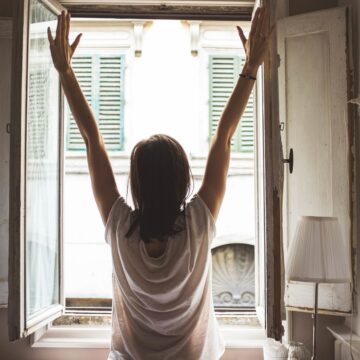
- Getting some sun in the morning can turn off your sleep hormones.
- Staying hydrated can make you feel more energized in the morning.
- The aroma of coffee boosts alertness.
In a May 2015 poll by international research data and analytics group YouGov, 86 percent of Americans reported feeling sluggish when they wake up in the morning.
But a study published in PLOS One in January 2020 revealed an interesting way to feel refreshed from the moment you open your eyes: using a tune you can hum or sing along to as an alarm signal.
The study involving 50 participants found that having an alarm signal with a melodic rhythm successfully slashed sleepiness. However, the research did not observe how long the effect lasted.
Besides changing your alarm signal, these simple, research-based ideas will perk you up in the morning:
1. Stick to a sleep schedule

Having an inconsistent sleeping schedule can mess with your circadian rhythm, the internal clock that regulates patterns of sleepiness and alertness, triggering brain fog.
According to Michael Twery, PhD, director of the National Center on Sleep Disorders Research, body chemistry works in cycles. A disturbance in these cycles can make waking up a struggle.
True enough, the National Sleep Foundation says that following a regular sleep schedule can make falling asleep and waking up easier.
According to a December 2018 assessment published in Sleep, the ideal sleeping hours is about seven to eight hours. But the National Sleep Foundation says it still takes 10 to 20 minutes to fall asleep once you get to bed, so make sure to consider this when setting your alarm.
2. Skip the snooze button

When you hit the snooze button when your alarm goes off, you begin to drift off to dreamland again, just to be jolted awake again when you’re almost in the sleep stage. This can confuse your brain and leave you feeling semi-lucid.
To prevent hitting the snooze alarm, put it somewhere you can’t easily reach it.
3. Breathe

Upon waking up, sit up in bed and take slow and long breaths for about two minutes to fill your cells with oxygen and give your respiratory system and energy levels a kickstart.
4. Drink up

According to sleep specialist Michael Breus, PhD, author of The Power of When, sleep makes you lose water at night. When you’re dehydrated, it can cause physical and mental grogginess.
5. Let the sunshine in

Bright light puts the brakes on melatonin, the hormone that your brain churns produces to make you fall asleep. Darkness can trigger melatonin, so getting some sunlight in the morning can counteract its effects.
According to a small January 2019 study published in Nature, melatonin declines when people are exposed to blue-enriched lights, which you can also use when the sun is not out.
A February 2016 study published in BMC Psychiatry found that a lightbox, a screen designed to simulate sunlight, can boost energy.
6. Get your blood pumping

An October 2013 review that appeared in Fatigue showed that exercise increases alertness in an instant and reduces fatigue by flooding your body and brain with energy-enhancing oxygen, says Breus.
7. Chill out

During your morning shower, make the water temperature progressively colder every 10 seconds. The cold forces your blood to send a danger signal to your brain, making you more alert.
8. Consume caffeine

According to a December 2016 review that appeared in Neuroscience & Behavioral Reviews, drinking half to three cups of a caffeinated beverage will help reverse mental and physical fatigue.
A June 2018 study that appeared in the Journal of Environmental Psychology further found that caffeine’s aroma can increase alertness.
9. Create a morning playlist

Having the right kind of music can perk you up, so rock out to fun songs while you’re getting ready for the day. According to a small May 2012 study that appeared in Experimental Psychology, people who listened to Vivaldi’s “Spring” concerto had increased levels of alertness and cognitive capacity. Another November 2004 study in Sleep and Biological Rhythms tuning in to high-energy tracks made them feel more awake post-nap.
Via Livestrong
